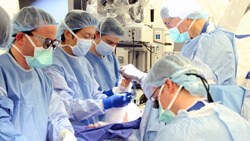
Physician Update
June 28, 2013

The experience raises the likelihood that vascularized composite allografts—multiple-tissue transplants such as those of the arms and hands—will become standard, or close to it, in the near future. “We see a great psychological as well as physical advantage in a patient to be restored whole,” Lee told a reporter.
The day of the procedure, 16 plastic, orthopedic and microvascular surgeons from Hopkins and other major centers formed two surgical teams for each arm. Earlier, a fifth team had flown out of state to procure the donor’s arms and vertebral bodies, the latter of which were for a later marrow infusion.
The result was an above-elbow transplant on Marrocco’s right side—joining bone, muscle, vessels, nerves and skin. The left side was more complicated, Lee says, even with the elbow still intact. “We designed a way to transplant all of the donor’s forearm muscles on top of the remaining recipient muscles and supply them with rerouted recipient nerves.” Usually, recipient nerves are cut at the amputation level. The new way should speed the young man’s use of his arm.
Rehab for Marrocco will take several years. Though it’s unlikely that he’ll see 100 percent restored use, previous patients have motor movement fine enough, say, to tie shoes. “The outcome,” says Lee, “is well worth the effort.””
443-997-1583 for information.

